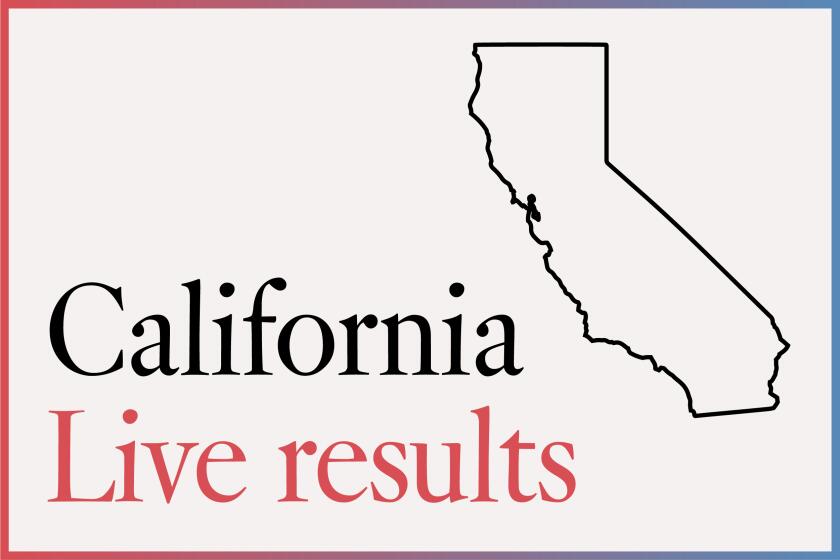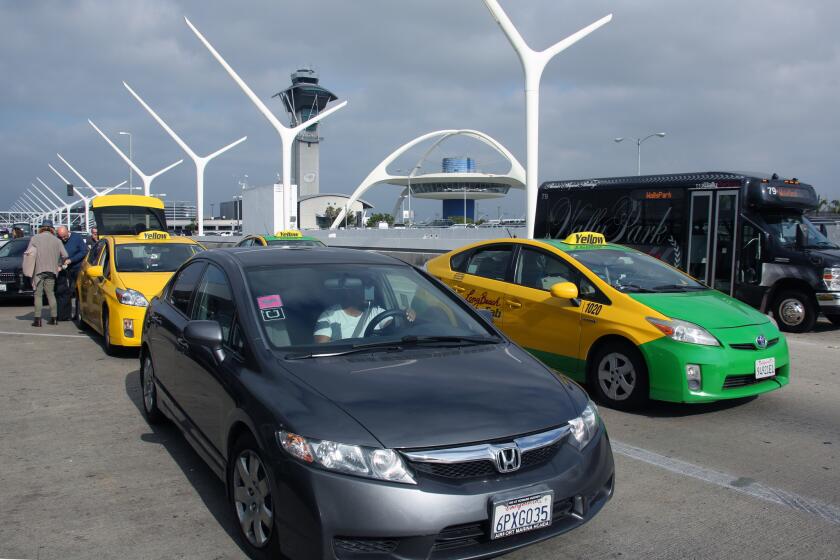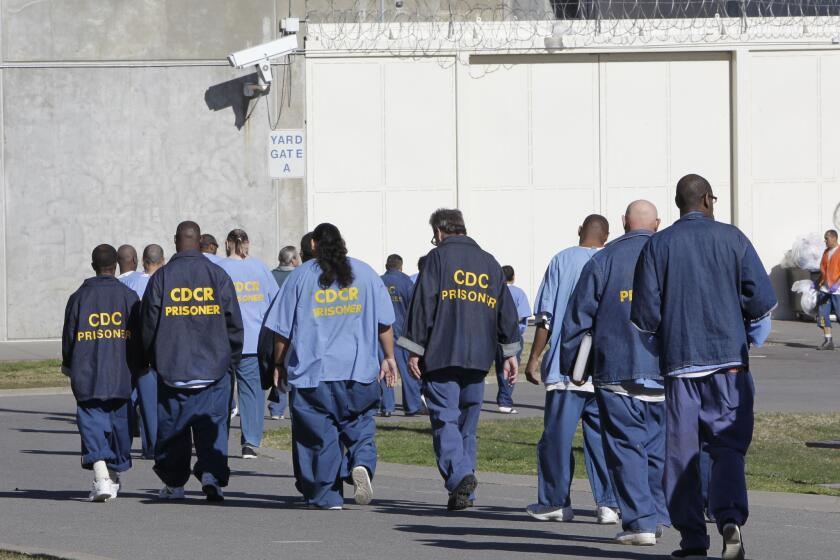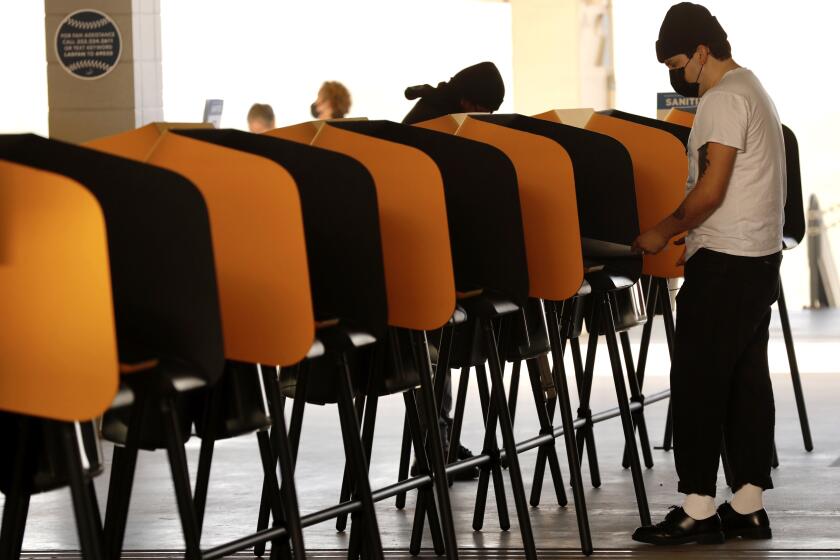California voters embrace special rules for app-based drivers, reject rent control plan
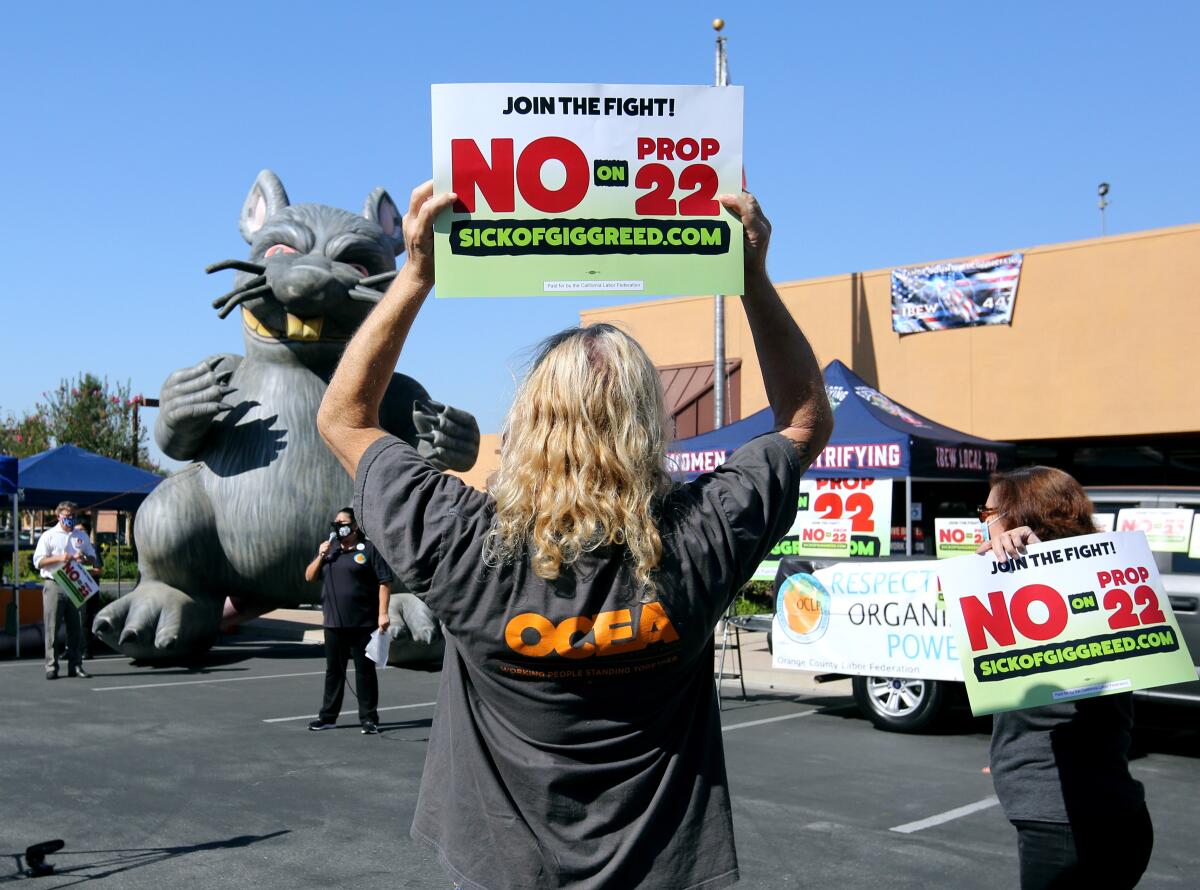
- Share via
SACRAMENTO — California’s most expensive ballot measure campaign season ended Tuesday with a split decision on the year’s most high-profile proposals, with voters granting companies such as Uber and Lyft the right to keep their drivers as independent contractors but rejecting a plan to expand rent control to more homes and communities.
Election night returns offered no clear sign in a fierce battle to raise business property taxes, a bitter campaign that surfaced long-simmering tensions over the legacy of the iconic tax-cutting law, Proposition 13.
In all, political action committees spent more than $785 million to support or oppose the 12 propositions on the November ballot, according to an analysis by The Times. Four of the 10 most costly ballot measure campaigns in California history were weighed by voters in this election, led by the $226 million in contributions either for or against Proposition 22, the effort by Uber and Lyft to ensure the companies’ drivers aren’t classified as company employees.
Proposition 22 maintained a steady lead in Tuesday returns, one of five ballot measures winning support from voters in urban and rural regions of California.
A consortium of other app-based companies joined Uber and Lyft in support of the proposed law, which would establish a unique employment classification for the companies’ drivers. The workers would be considered independent contractors but provided wage guarantees for time spent behind the wheel and eligibility for healthcare subsidies. Those benefits would not, however, be as generous as the ones guaranteed under state law to company employees.
The initial returns suggested a clear rebuke of criticisms leveled against the companies by liberal Democrats and organized labor, who had balked at giving the industry’s drivers an exemption from employee rules.
California voters approve Prop. 22, allowing Uber and Lyft drivers to remain independent contractors
Proposition 22 creates special employment rules for California app-based companies, allowing drivers to remain independent contractors.
Democratic lawmakers also saw their interests cast aside in the likely defeat of Proposition 16, an attempt to reinstate affirmative action policies, allowing race and gender preferences in college admissions and government employment. Voters banned those programs in 1996 and civil rights groups have long argued that the ban stands as a barrier to racial equity and equality. Election night returns were in line with a spate of recent polls showing a majority of voters opposed Proposition 16, choosing instead to keep the ban on preferential policies enshrined in the California Constitution.
Few ballot measures could claim to have sparked a more historic political battle than Proposition 15, the most far-reaching effort in more than four decades to rewrite the rules governing taxes levied on commercial and industrial properties. The proposal sought to limit the protections enshrined in 1978’s landmark Proposition 13 to homeowners and agricultural land, earmarking billions of dollars of new business property tax revenues for public schools and local governments.
Opponents of Proposition 15 may have been dealt an especially lucky political hand, pointing to California’s pandemic-induced recession as the wrong time to raise taxes on businesses. While the measure trailed for most of Tuesday night, the margin was very close with ballots still left uncounted.
Two of three criminal justice measures on the statewide ballot came up short in election night returns. Proposition 25, which would outlaw the use of cash payments for release from jail while awaiting a court hearing, was behind in late-night returns with 54% of the tallied votes opposed. The proposal was a referendum that asked voters to approve or reject the law written by the California Legislature in 2018. That statute has been on hold for almost two years, left in limbo after groups funded by the bail bonds industry gathered enough voter signatures to place the issue on the ballot.
Still, it is unlikely to be the end of the debate. While a diverse coalition of groups supported the effort at the state Capitol to abolish cash bail, there was sharp disagreement over the law in question and its use of judge-approved formulas designed to assess the risk that a person would flee or commit another crime while back in the community. State lawmakers could try again to craft a plan for ending cash bail once they reconvene in Sacramento for the new two-year legislative session.
The measure hit the ballot just as the Black Lives Matter movement was drawing new attention to demands for change in the criminal justice system.
Proposition 20, an attempt to ensure people convicted of any of several serious crimes would be ineligible for early release, was resoundingly defeated. The proposition was opposed by former Gov. Jerry Brown, who said the proposal would have unraveled portions of the 2016 ballot measure he persuaded voters to enact as a major step toward focusing on prisoner rehabilitation.
The only criminal justice measure to win Tuesday was Proposition 17, an effort to offer voting rights to adults on parole.
Californians who are on parole after being convicted of a felony will be allowed to vote in future elections under Proposition 17.
Voters were less thrilled with extending new voting rights to some 17-year olds in California, sharply rejecting Proposition 18, which would have allowed those teens to vote in primary elections if their 18th birthday falls before the general election.
Two expensive ballot measure campaigns, both appearing to end in defeat, were largely repeats of proposals that were rejected by voters in 2018. Proposition 21, a closely watched proposal to bring more apartments and even some single-family homes under rent control, was rejected with almost 60% of voters opposed in early returns. The initiative promised to expand the use of rent control to more California communities and loosen the rules so that more apartments and some single-family residences would qualify.
Nor was there success for the healthcare union that championed Proposition 23, the second attempt to rewrite the regulations governing the kidney dialysis centers. The $114-million slugfest followed a similar unsuccessful effort two years ago by Service Employees International Union-Healthcare Workers West and the measure failed to win a majority of votes.
Voters faced a different kind of do-over in Proposition 24, a ballot measure designed to add rules governing the privacy of consumer data. Supporters of a 2018 law that launched the effort, the California Consumer Privacy Act, were split on whether this year’s ballot measure was the right call. The initiative’s supporters promised it would give Californians additional control over their personal information and ensure online privacy for children, but the campaign took an unexpected turn in the final days of the election over accusations that Google searches for information about Proposition 24 wrongly highlighted information written by opponents.
Passage also seemed certain for Proposition 14, a plan for borrowing $5.5 billion to keep the state’s stem cell research operations in place. The money would provide a new lifeline for the research programs overseen by a quasi-government agency created by voters in 2004, which has spent almost all of its initial state bond funding.
Proposition 19, a generous new property tax break for older California homeowners, partly paid for by removing a low-tax guarantee for those who inherit a home from a parent or grandparent, also seemed poised to pass. Supporters highlighted that the property tax benefit also would be given to those who lose a home in a wildfire.
In all, Californians weighed the merits or pitfalls of a dozen statewide propositions, a mixture of ideas placed on the Nov. 3 ballot either through the backing of well-funded political action committees or submitted to voters by the Legislature. Most of the 12 ballot measures failed to break through the cacophony of the presidential election.
Unlike prior elections, most of the state’s ballots were counted on election night. More than 11 million ballots had been received by elections officials before in-person voting began Tuesday, representing roughly half of all registered voters. The volume of ballot counting stretched the capacity of county elections offices, operating in many cases under special rules in response to the COVID-19 pandemic.
No change in response to the public health crisis was more pronounced than the push toward remote voting. With every registered voter receiving a ballot in the mail last month, the state’s most populous counties established a network of drop boxes at government buildings, grocery stores and other high-traffic locations. Many counties that stuck with traditional election day polling places in the past chose this time to open early voting sites, hoping to minimize the size of crowds that would otherwise show up Tuesday.
For much of the past decade, the tabulation of votes has routinely taken days or even weeks, the result of a series of state laws designed to ensure as many votes are counted as possible. Elections officials have until early December to complete the counting of ballots.
More to Read
Sign up for Essential California
The most important California stories and recommendations in your inbox every morning.
You may occasionally receive promotional content from the Los Angeles Times.
